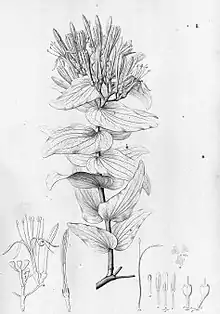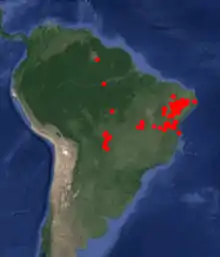Psittacanthus cordatus
Psittacanthus cordatus is a species of Neotropical mistletoe in the family Loranthaceae, which is native to Bolivia and Brazil.[3]
| Psittacanthus cordatus | |
|---|---|
 | |
| Psittacanthus cordatus | |
| Scientific classification | |
| Kingdom: | Plantae |
| Clade: | Tracheophytes |
| Clade: | Angiosperms |
| Clade: | Eudicots |
| Order: | Santalales |
| Family: | Loranthaceae |
| Genus: | Psittacanthus |
| Species: | P. cordatus |
| Binomial name | |
| Psittacanthus cordatus | |
 | |
| Occurrence data from GBIF[2] | |
| Synonyms[3] | |
Description
Psittacanthus cordatus initially grows upward and then becomes pendulous, with the shape of its stems being circular.[4] The leaves are opposite, with the base of the leaf being obtuse to cordate, and the apex, acute.[4] The position of the racemose inflorescence is both axillary and terminal.[4] The flowers form groups of three (triads) on a stem, and are red to yellow.[4] The style is straight.[4]
Habitat
It is found in the Amazon Rainforest, the Central Brazilian Savanna, Atlantic Rainforest and Pantanal,[4] in the Caatinga, Carrasco Vegetation, Cerrado ecoregion, Riverine Forest and/or Gallery Forest, Terra Firme Forest, flooded forest (Várzea), and Tropical Rain Forest.[4]
Taxonomy
Psittacanthus cordatus was first described by Hoffmansegg in 1829 as Loranthus cordatus,[5][6] and in 1834, Don assigned it to the new genus Psittacanthus.[1][7] There is some confusion with respect to the accepted name: Plants of the World online[3] and Flora do Brasil[4] give the accepted name as Psittacanthus cordatus (Hoffmans.) G.Don, while GBIF[8] gives the accepted name as Psittacanthus cordatus Blume.
Etymology
Psittacanthus comes from the Greek psittakos (parrot), and the Greek anthos (flower), chosen according to Don,[9] possibly because of the bright colours. Cordatus is the Latin for cordate or heart-shaped[10]
References
- "IPNI: Psittacanthus cordatus". International Plant Names Index. Retrieved 24 May 2018.
- GBIF: Psittacanthus cordatus occurrence download
- Govaerts, R. et al. 2018. "Plants of the World online: Psittacanthus cordatus". Board of Trustees of the Royal Botanic Gardens, Kew. Retrieved 20 May 2018.
- "Psittacanthus cordatus (Hoffmanns.) G.Don". Flora do Brasil 2020: Algae, Fungi, Plants, Jardim Botânico do Rio de Janeiro. Retrieved 19 May 2018.
- "IPNI: Loranthus cordatus". International Plant Names Index. Retrieved 24 May 2018.
- Hoffmannsegg, J.C. 1829. Systema vegetabilium Editio nova Volumen septimi pars prima, ed. 15 bis (Roemer & Schultes) 7(1): 128.
- Don, G. 1834. A general history of the dichlamydeous plants :comprising complete descriptions of the different orders...the whole arranged according to the natural system 3: 416.
- GBIF: Psittacanthus cordatus (Hoffmgg.) G.Don
- Don, G. 1834. "A general history of the dichlamydeous plants :comprising complete descriptions of the different orders...the whole arranged according to the natural system 3: 415".
- Stearn, W.T. 2004. Botanical Latin 4th Edition, p.391. Timber Press, Portland, Oregon